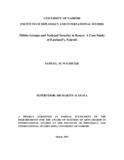| dc.description.abstract | There is a negative relationship between militias and national security. Militias tend to challenge the operations of a state in many ways. This ranges from undermining state‟s monopoly in the use of force to illegal taxation, serious intimidation and predation of citizens. Consequently, there has been sustained global and national scholarly and policy focus on specific ways militias emerge, their practices and how they undermine national security. This study falls within this terrain of militias and national security. It has examined the question of militias and their impact on Kenya‟s national security with particular focus on militia activities in the Eastlands parts of Kenya‟s capital city Nairobi. The area has witnessed high concentration of militias cum organized criminal groups. Special attention has being given to Mungiki which has been dominant. Theoretically, the study has been guided by multi-sectoral and multilevel approach to security and securitization theory. Multi-sectoral and multilevel approach is based on the argument that threats to security are both militarized and non-militarized. Also, they affect various sectors notably military, political, economic, societal and environmental. Securitization theory which is closely associated with Copenhagen and Paris schools of security acknowledges the reality that different states have varied security priorities. Significantly, the theory moves security agenda from been an objective phenomenon to being subjective and contextual depending on these priorities. These way many issues can be brought under the umbrella of security. Methodologically, the study is both qualitative and quantitative owing to the nature of data the researcher sought. It used both primary and secondary data. Primary data was collected through interviews and informal conversations whereas qualitative data was mainly collected through desk study review. The main finding of the study is that militias have undermined Kenya‟s national security. They have challenged state‟s monopoly in the use of force, corrupted its institutions, are used as tools of violence by political and economic actors, created an architecture of fear in the areas they operate severely weakening human security, have exacerbated poverty and unemployment. However, despite the challenges they pose, they have also played a key role in provision of public services and security in ungoverned urban spaces long neglected by the government | en_US |

